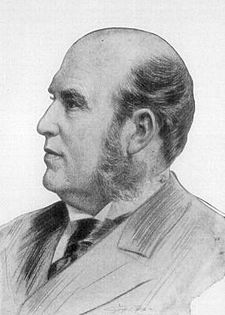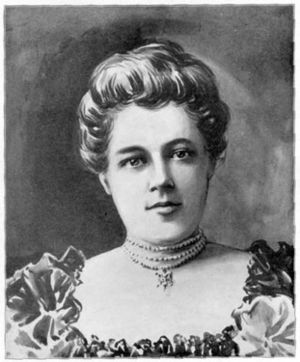Philip Danforth Armour facts for kids
Philip Danforth Armour Sr. (born May 16, 1832 – died January 6, 1901) was an important American businessman. He founded a huge meatpacking company called Armour & Company in Chicago.
Philip Armour started his career during the California Gold Rush in the 1850s. He earned a lot of money there. Later, he moved into the meat business. He became very successful by using new ideas. These included setting up an assembly line to process meat quickly. He also found ways to use almost every part of the animal, saying he used "everything but the squeal!"
Armour also helped develop refrigerated rail cars. This allowed his company to send fresh meat all across the country. By 1900, his businesses employed 15,000 people. He was also known for giving money to good causes, especially in Chicago. He helped create the Armour Institute of Technology, which is now part of the Illinois Institute of Technology.
Contents
Early Life and Business Start
Philip Armour was born in Stockbridge, New York. He grew up on a farm with his seven brothers and sisters. His family had Scottish and English roots. He went to school at Cazenovia Academy but was asked to leave.
When he was 19, Philip joined about 30 other people heading to California. This was during the exciting California Gold Rush. His parents gave him money, so he helped pay for the trip. In California, he started his own business. He hired miners to build special water channels called sluices. This business was very successful. By age 24, he had saved about $8,000.
Growing a Meatpacking Empire
With his money, Armour moved to Milwaukee, Wisconsin. He started a business selling groceries in large amounts. In 1859, he partnered with Frederick Miles in the grain business. Three years later, he joined John Plankinton in the meatpacking industry. Their company was called Plankinton, Armour & Company.
They quickly became successful. They sold meats, fresh foods, and grains to people moving west. During this time, in 1862, Philip married Malvina Belle Ogden. Philip Armour was very smart about business. He made a lot of money during the Civil War. He guessed that meat prices would drop when the war ended. He made deals to sell pork at high prices before the war finished. This earned him a profit of $1 million to $2 million. This success helped his company grow into new cities.
Later, Philip and his brother Herman started a grain business again. They also built several meatpacking plants in the Menomonee River Valley. In 1867, Philip, Herman, and their brother Joseph joined together. They formed the main company, Armour & Company, in Chicago. For its first eight years, the company focused only on packing hogs.
Armour & Company grew to be one of the world's largest food processing businesses. It was the first company to make canned meat. It was also one of the first to use an "assembly-line" method in its factories.
Helping Others and Innovation
In the winter of 1879–1880, Philip Armour heard about a group of formerly enslaved people. They had moved from the South to Wyandotte County, Kansas. They were not ready for the cold winter. Armour went to Kansas to see them. He was impressed by how smart they were. They told him they just wanted to go North to find freedom.
Armour returned to Chicago and raised money to help them. He got $1,200 from Chicago businesses. His own company, Armour and Company, gave $200.
To get his meat products to customers, Armour followed the lead of his competitor, Gustavus Swift. In 1883, he started the Armour Refrigerator Line. This became the largest private fleet of refrigerator cars in the U.S. By 1900, he had over 12,000 refrigerated cars. These cars were all built in Armour's own factory.
His meatpacking plants were pioneers in using large-scale organization. They also used refrigeration in the industry. Armour used the assembly line to make production faster. He also worked to reduce waste from slaughtering animals. He made sure that almost every part of the animal was used. This led to new businesses making glue, fertilizer, margarine, and gelatin. Armour famously said he used "everything but the squeal." By making these changes, Armour & Co. became one of America's biggest meatpacking companies by the 1890s.
Working Conditions and Labor Issues
After the Civil War, workers in Chicago wanted stronger labor unions. They fought for an eight-hour day and higher wages. At that time, a family of five needed about $15.40 a week to live. However, workers at Armour & Company earned only about $9.50 a week.
When Armour's butchers asked for better pay in the early 1880s, Armour fired the union workers. He also made a list of the strike leaders so they couldn't get other jobs. Philip Armour stopped three major strikes at his factories during his career. He blacklisted all the union leaders involved. Even though his workers lived and worked in difficult conditions, Armour was also known for his charity.
Death and Lasting Impact
In 1893, Philip Armour gave $1 million to start the Armour Institute of Technology. This was a private college for both boys and girls. It later joined with another school to become the Illinois Institute of Technology (IIT) in 1940. He also created the Armour Mission, which was a center for education and healthcare. In 1900, his son, Philip D. Armour Jr., passed away.
Philip Armour died on January 6, 1901, from pneumonia at his home in Chicago. His wife, Malvina Belle Ogden, and his son, J. Ogden Armour, survived him.
Several places were named after him. These include the town of Armour, South Dakota, and Armourdale, Kansas (now part of Kansas City, Kansas). Streets in Cudahy, Wisconsin, and Oconomowoc, Wisconsin, also carry his name. Even the Union Pacific Railroad uses "Armour Yellow" as one of its official colors. This is the same color used by Armour's refrigerated cars long ago.
See also
 In Spanish: Philip Danforth Armour para niños
In Spanish: Philip Danforth Armour para niños
 | Aurelia Browder |
 | Nannie Helen Burroughs |
 | Michelle Alexander |



